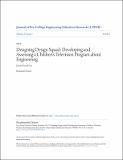| dc.contributor.author | Frey, Daniel | |
| dc.contributor.author | Powers, Benjamin George | |
| dc.date.accessioned | 2018-11-20T14:43:19Z | |
| dc.date.available | 2018-11-20T14:43:19Z | |
| dc.date.issued | 2012-04 | |
| dc.identifier.issn | 2157-9288 | |
| dc.identifier.uri | http://hdl.handle.net/1721.1/119215 | |
| dc.description.abstract | This paper describes a multi-media outreach campaign intended to increase children’s knowledge of engineering and to improve the public image of the profession. The central element is a reality-based show entitled Design Squad, whose first season was broadcast on public television stations beginning in the spring of 2007. The show was developed through iterations of prototype episodes and formative assessment with focus groups. The program features two teams of teenagers competing to solve engineering challenges posed by clients. Design Squad highlights the excitement and enjoyment that come from creative technical work. The contestants use modern components including microcontrollers, sensors, and actuators, providing the viewing audience needed exposure to the inner workings of modern technology. The program was broadcast on Public Broadcasting Service television stations nationally. A summative assessment of season #1 was conducted including 139 children who viewed four episodes. The study indicated that the program positively influenced viewers’ attitudes about engineering and increased interest in after-school engineering programs. The assessment also suggested that viewers learned about engineering, but they also generalized incorrectly from what they saw. An extensive outreach effort enabled about 30,000 viewers to follow up on their interest in engineering by doing simple design challenges and interacting with knowledgeable adults. Comparison with another reality-based children’s educational program entitled Fetch with Ruff Ruffman gives insight into how content and format affect outcomes. Keywords: design education, educational television, project-based learning | en_US |
| dc.description.sponsorship | National Science Foundation (U.S.) (0234408) | en_US |
| dc.description.sponsorship | National Science Foundation (U.S.) (CAREER Award 0448972) | en_US |
| dc.description.sponsorship | Singapore. Ministry of Education | en_US |
| dc.description.sponsorship | Intel Foundation | en_US |
| dc.description.sponsorship | Institute of Electrical and Electronics Engineers (IEEE) | en_US |
| dc.description.sponsorship | Tyco International Ltd. | en_US |
| dc.description.sponsorship | American Society Of Civil Engineers | en_US |
| dc.description.sponsorship | Noyce Foundation | en_US |
| dc.description.sponsorship | Harold and Esther Edgerton Family Foundation | en_US |
| dc.publisher | Purdue University Press | en_US |
| dc.relation.isversionof | http://dx.doi.org/10.5703/1288284314651 | en_US |
| dc.rights | Creative Commons Attribution-NonCommercial-NoDerivs License | en_US |
| dc.rights.uri | http://creativecommons.org/licenses/by-nc-nd/4.0/ | en_US |
| dc.source | Purdue University Press | en_US |
| dc.title | Designing Design Squad: Developing and Assessing a Children’s Television Program about Engineering | en_US |
| dc.type | Article | en_US |
| dc.identifier.citation | Frey, Daniel, and Benjamin Powers. “Designing Design Squad: Developing and Assessing a Children’s Television Program about Engineering.” Journal of Pre-College Engineering Education Research, vol. 2, no. 1, Apr. 2012, pp. 1–20. | en_US |
| dc.contributor.department | Massachusetts Institute of Technology. Department of Mechanical Engineering | en_US |
| dc.contributor.mitauthor | Frey, Daniel | |
| dc.contributor.mitauthor | Powers, Benjamin George | |
| dc.relation.journal | Journal of Pre-College Engineering Education Research | en_US |
| dc.eprint.version | Final published version | en_US |
| dc.type.uri | http://purl.org/eprint/type/JournalArticle | en_US |
| eprint.status | http://purl.org/eprint/status/PeerReviewed | en_US |
| dc.date.updated | 2018-11-16T14:44:11Z | |
| dspace.orderedauthors | Frey, Daniel; Powers, Benjamin | en_US |
| dspace.embargo.terms | N | en_US |
| dc.identifier.orcid | https://orcid.org/0000-0002-9886-7512 | |
| mit.license | PUBLISHER_CC | en_US |
